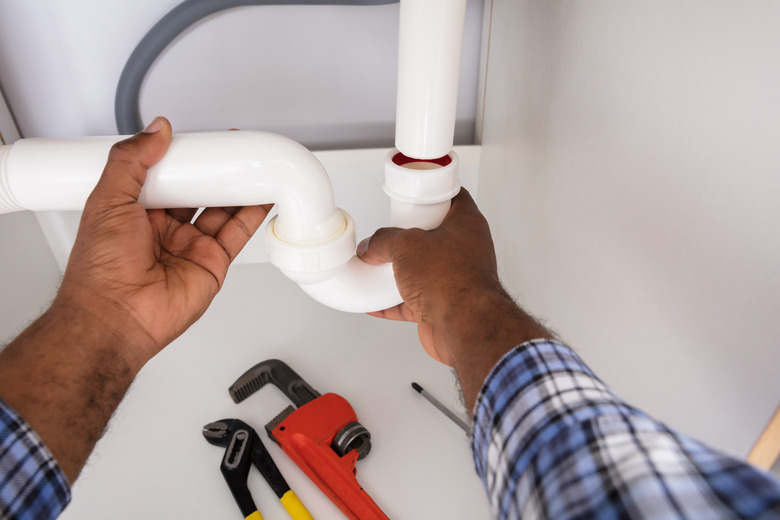Does Lye Work For PVC Drains?
Most household plumbing consists of a mix of metal piping (steel, copper) and plastic PVC tubing. All sorts of PVC plumbing, whether kitchen or bathroom, can face problems from mineral buildup, material in the line, excessive dirt and grease, and very acidic or basic substances.
Lye is an incredibly basic, alkaline metal compound (sodium hydroxide), often used as a soap for cleaning purposes. This caustic can deteriorate metal piping and, in some forms, as when mixed with an aluminum compound to increase its cleaning power, can easily generate enough heat to warp or deform PVC piping.
Tip
Lye should not be used in PVC piping, as it has the ability to generate heat and warp or otherwise deform the pipes.
What Is PVC?
PVC is short for polyvinyl chloride, the polymer that makes up most plastic plumbing parts. PVC is commonly used in household plumbing because it's an inexpensive, readily available material that can be shaped into hundreds of easily produced standard parts.
The surface of PVC is known to be exceptionally inert, meaning few chemicals will interact with it, unlike metals which can rust or form buildup. It's also lightweight and easy to use, which has made it a standard in the household and plumbing industries.
Chemical Reactivity and PVC
While PVC has very low chemical reactivity, it also suffers one major flaw: PVC has a melting point of 176 degrees Fahrenheit and is only guaranteed to manage temperatures up to 140 F without softening. As an example, boiling water is 212 F.
This is important because the chemical reactions of the main types of drain cleaning chemicals — acids, caustics and oxidizers — release heat. Some heat is usually needed to melt grease and help clogs move more easily through the plumbing, but excessive heat generation can cause the PVC pipes to soften or even melt. In addition, even though PVC is incredibly unreactive, most of these cleaning chemicals are incredibly reactive, meaning that given the slightest weakness they could degrade even PVC piping at high enough concentrations.
Reactions of Lye and PVC
Since lye is so basic and caustic, it can harm PVC piping. The chemical should not react with the surface of the PVC piping, but if used incorrectly at high concentrations, it could eat away at a crack or flaw in the piping, causing it to fail. ASAP Drain Guys & Plumbing recommends never using lye as a drain cleaner, despite how effective it is, because it is so caustic. Thornton & Grooms recommends using mechanical tools, like a drain snake or drain bladder, before trying harsh chemicals.
If you decide to use powerful chemicals, such as lye, to attack buildups in plumbing, it's important to always follow the manufacturer's instructions. There should be details on how to properly dilute and apply a lye solution to the best effect without risking any damage to the pipes or the system. Always use gloves and safety glasses as well as a breathing mask, and make sure the area can be well-ventilated afterward.
Safe Chemical Usage
In addition, it's important to never mix cleaning chemicals like lye and another cleaner. Acids, caustics and organics are all highly reactive with each other as well as water, and mixing can result in extreme heat or pressure buildup, leading to potential explosive capacity. This can cause extensive damage as well as personal injury.
Further, mixing noncompatible chemicals can also result in chemical reactions that create dangerous poison or toxic vapors, which can harm or potentially kill an individual. After using any sort of strong cleaning chemical, be sure to rinse the system thoroughly with excess water to ensure flushing and dilution before attempting another kind of treatment.
